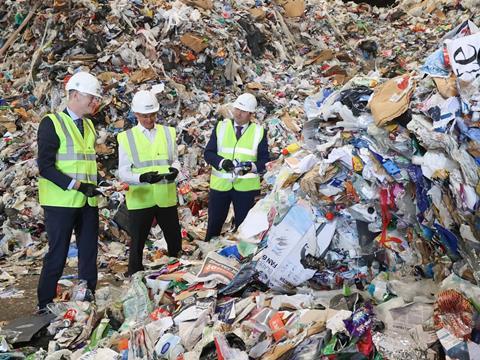
The Alliance for Beverage Cartons and the Environment – ACE Ireland has partnered with Panda to implement robotic sorting technology into its materials recovery facility in Ballymount, aiming to improve dedicated sorting and optimise recycling processes.
Installed at Panda’s facility in Ballymount, Dublin, the robot is set to identify, pick, and sort cartons into their respective streams using artificial intelligence that claims to be as accurate as the human eye. The automated sorting technology was developed by Recycleye and Fanuc and can apparently deliver 33,000 picks over a ten-hour shift.
It is designed to scan, detect, and pick 28 classes of material, which includes beverage cartons. According to ACE Ireland, the sorter is easy to install on existing recycling lines, minimises disruption to the facility’s operations, and lowers the cost of automated sorting.
Once sorted, the materials will be sent on to ACE’s UK-based specialised carton recycling facility, which is operated by Sonoco Stainland.
Richard Hands, chief executive of ACE Ireland, said: “The beverage carton is a sustainable, recyclable, and renewable packaging choice used by Irish households as part of everyday life for many decades. As an industry we are committed to increasing carton recycling rates and improving recycling practices through targeted investment, the development of new technology, and working with industry partners.
“The carton industry has set a target of achieving a 70% recycling rate by 2030. The launch of dedicated sorting at Ireland’s largest MRF in Ballymount is an important step in meeting that target. Introducing new and emerging sorting technologies across Ireland’s MRF network should be a key focus in the transition to a circular economy. This will allow MRFs to separate more materials and increase overall recycling rates.
“We welcomed the commitment to introduce specific packaging recovery and recycling targets for beverage cartons in the Irish Government’s Waste Action Plan for a Circular Economy. We encourage the Department of Environment, Climate, and Communications to follow-up on that commitment and prioritise the setting of these targets. This together with the installation of new technology can drive higher recycling rates and lower residual waste streams.”
Brian McCabe – CEO of Beauparc, Panda’s parent company – said: “Working with ACE Ireland, we are delighted to announce our long-term commitment to sorting cartons at our Ballymount MRF. We receive over 90,000 tonnes of mixed dry recyclable materials into the Ballymount facility per annum from over 400,000 homes, all of which needs to be sorted into different waste streams. As such, we recognise the important role we have in delivering and supporting innovation to enhance recycling and waste management in Ireland.
“The installation of this latest generation of robotic sorting technology in Ballymount will allow us to significantly increase the quality of target materials extracted from sorting lines in the MRF. We anticipate over 500 tonnes of cartons will be sorted per annum for onward recycling with an expectation that this will further increase as we bed in the new technology.
“Ireland has the unique advantage of having a 100% kerbside collection system in place for household mixed dry recycling. Our message to the consumer is to place cartons into the green or blue recycling bin – clean, dry, and loose – along with their other recyclable materials.”
Tracer-based sorting technology developed by Fraunhofer Institute for Process Engineering and Packaging IVV claims to distinguish flexible food packaging from its non-food counterparts during the packaging and recycling processes and has reportedly achieved a 97% sorting purity and 90% sorting efficiency.
Additionally, the HolyGrail 2.0 initiative began testing its digital watermarking technology for detection, ejection, purity, and other features in three industrial-level testing facilities earlier this year. In May, it claimed to successfully separate food and non-food PET packaging waste streams in an industrial environment.
If you liked this article, you might also enjoy:
The Lidl approach to packaging sustainability
How did Brazil achieve its 100% aluminium can recycling rate – and can it be replicated in the EU?
Experts have their say on the EU’s Packaging and Packaging Waste Directive revisions
A deep dive into the most important packaging sustainability trends and solutions














No comments yet